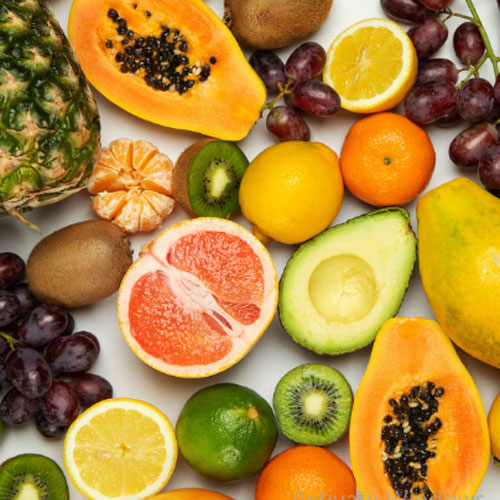Phone: +91-9890481729

Fruits are a diverse group of edible plant products that are typically sweet or sometimes sour in taste. They are known for their vibrant colors, various flavors, and nutritional benefits. Fruits are an essential part of a balanced diet and provide a wide range of vitamins, minerals, fiber, and antioxidants.
Here are some key points about fruits:
1. Types and Varieties: Fruits come in numerous types and varieties, each with its own unique characteristics. Common fruits include apples, bananas, oranges, strawberries, grapes, watermelons, pineapples, mangoes, peaches, pears, and many more. Fruits can be categorized into different groups, such as citrus fruits, berries, tropical fruits, stone fruits, and pome fruits.
2. Nutritional Value: Fruits are nutrient-dense and offer a wealth of health benefits. They are rich in essential vitamins, including vitamin C, vitamin A, and folate. Fruits also provide minerals like potassium, magnesium, and calcium. Additionally, fruits ar
e a good source of dietary fiber, which aids in digestion and promotes satiety. Different fruits have varying nutrient profiles, so it's beneficial to consume a variety of fruits to obtain a broad spectrum of nutrients.
3. Health Benefits: Regular consumption of fruits is associated with numerous health benefits. Their high content of vitamins, minerals, and antioxidants supports overall well-being and helps maintain a healthy immune system. Fruits are also rich in dietary fiber, which promotes healthy digestion, regulates blood sugar levels, and may lower the risk of certain chronic diseases, such as heart disease and type 2 diabetes.
4. Culinary Uses: Fruits are incredibly versatile and can be enjoyed in various ways. They can be eaten fresh as a snack, added to smoothies, blended into juices, or used as toppings for breakfast cereals, yogurt, or desserts. Fruits are also commonly used in baking, making jams and jellies, and creating flavorful sauces and salsas.
5. Selecting and Storing: When selecting fruits, consider their ripeness, color, and texture. Look for fruits that are firm, with vibrant colors and a pleasant aroma. Avoid fruits that are bruised, damaged, or overly soft. The storage requirements vary depending on the fruit. Some fruits, like berries and grapes, are best stored in the refrigerator, while others, like bananas and apples, can be kept at room temperature.
6. Seasonality: Fruits have different seasons of peak freshness and availability throughout the year. Some fruits are available year-round, while others have specific harvest times. Choosing fruits that are in season ensures optimal flavor and quality. Additionally, buying local and seasonal fruits often supports local farmers and reduces the environmental impact associated with long-distance transportation.
Incorporating a variety of fruits into your diet provides a delicious way to enhance your nutrition and overall well-being. Whether enjoyed on their own or used in culinary creations, fruits offer a natural and refreshing source of essential nutrients and contribute to a healthy lifestyle.
Quick Enquiry
Copyright © 2023 Swojas Exports| All Rights Reserved. Website Designed & Promoted by Web2Export

